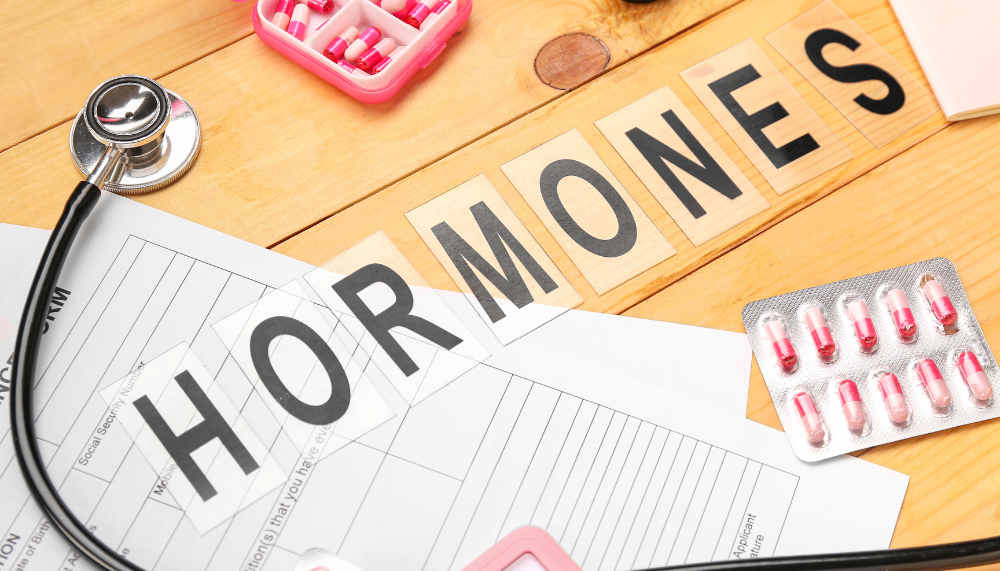What Is Hormonal Imbalance?
Hormonal imbalance occurs when there is too much or too little of a hormone in the bloodstream. Hormones are chemical messengers produced by glands like the ovaries, pituitary gland, and thyroid. Even small imbalances can cause major changes in the body.
Common Causes of Hormonal Imbalance in Nigerian Women
- Stress – High levels of stress, common in urban Nigerian life, can raise cortisol and disrupt other hormone levels.
- Polycystic Ovary Syndrome (PCOS) – A leading cause of hormonal imbalance and infertility.
- Poor Diet – Excess sugar, processed foods, and lack of nutrients affect hormone regulation.
- Sedentary Lifestyle – Lack of physical activity can influence insulin and estrogen levels.
- Birth Control Pills – While effective for family planning, they can sometimes disrupt hormonal balance.
- Environmental Toxins – Exposure to plastics, pesticides, and chemicals found in some beauty products.
- Thyroid Disorders – Common but underdiagnosed in Nigeria, affecting metabolism and mood.
- Menopause or Perimenopause – Natural decline in hormones as women age.
Symptoms of Hormonal Imbalance in Nigerian Women
Hormonal imbalance can present differently in each woman, but common symptoms include:
- Irregular or missed periods
- Unexplained weight gain or difficulty losing weight
- Severe menstrual cramps (dysmenorrhea)
- Excessive facial or body hair (hirsutism)
- Persistent acne, especially along the jawline
- Mood swings, anxiety, or depression
- Low libido or painful sex
- Hair thinning or hair loss
- Fatigue and low energy
- Infertility or difficulty conceiving
How to Diagnose Hormonal Imbalance in Nigeria
If you suspect a hormonal imbalance, visit a qualified medical professional. Common diagnostic steps include:
- Hormone blood tests (estrogen, progesterone, testosterone, thyroid hormones, etc.)
- Pelvic ultrasound to check for ovarian cysts (PCOS)
- Thyroid function tests
- Medical and menstrual history evaluation
Treatment Options for Hormonal Imbalance
1. Medical Treatments
- Hormone Replacement Therapy (HRT): For menopause or severe hormone deficiencies.
- Oral Contraceptives: Used to regulate menstrual cycles and hormonal acne.
- Metformin: Prescribed for insulin resistance, especially in PCOS cases.
- Fertility Treatments: For women struggling with conception.
Note: Always seek medical advice before starting any medication.
2. Natural and Lifestyle Remedies
a. Balanced Diet
- Eat local, hormone-friendly foods like:
- Leafy greens (Ugwu, waterleaf)
- Healthy fats (avocado, palm oil in moderation, groundnuts)
- Fruits (pawpaw, oranges, guava in moderation)
- Protein sources (eggs, fish, beans)
Avoid:
- Sugary drinks (soft drinks, sweetened zobo)
- Excess carbs like white rice and garri
- Processed snacks and junk food
b. Regular Exercise
- Aim for 30 minutes of daily movement: brisk walking, dancing, or home workouts.
c. Herbal Remedies
- Dong Quai and Maca root (available at herbal shops) are used to balance female hormones—use under guidance.
- Bitter leaf juice and scent leaf tea are traditional Nigerian options for detox and hormonal support.
d. Stress Management
- Practice relaxation techniques: prayer, deep breathing, and adequate sleep (7–8 hours).
- Reduce workload and avoid burnout—common among Nigerian working mothers.
e. Reduce Environmental Toxins
- Avoid heating food in plastic containers.
- Use natural skincare and hair products free from harsh chemicals.
- Stay away from bleaching creams, which may contain hormone-disrupting ingredients.
When to See a Doctor
See a doctor or gynecologist in Nigeria if:
- Your periods are consistently irregular or painful
- You’ve been trying to conceive without success for over 6 months
- You experience severe fatigue, hair loss, or mood changes
- Acne or weight gain is not responding to lifestyle changes
Hormonal imbalance is a serious but manageable condition affecting many Nigerian women. Through increased awareness, proper diagnosis, and a combination of medical and lifestyle treatments, you can regain control of your hormones and health. Always listen to your body, seek professional help when needed, and embrace a balanced, local approach to wellness.
